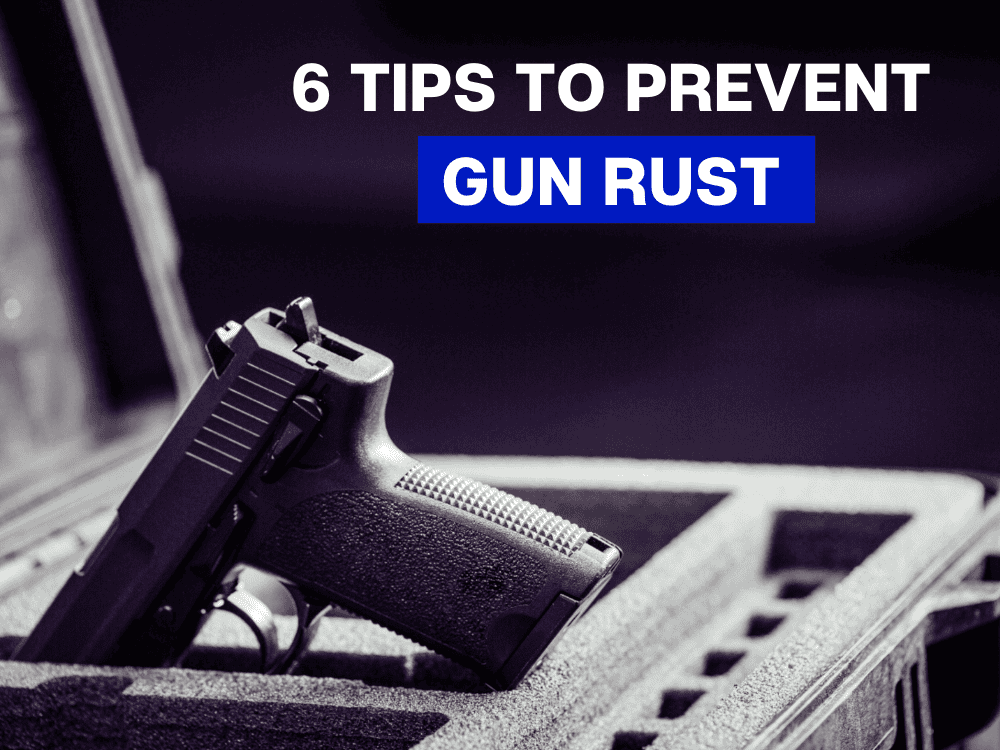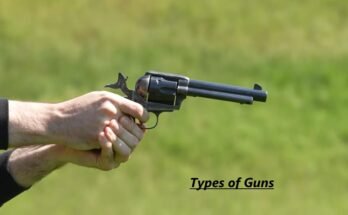Yes, guns can rust in the rain due to moisture. Rainwater can cause corrosion if firearms are not properly maintained.
Exposure to rain poses a significant risk to firearms, as the presence of water accelerates the oxidation process, leading to rust. Gun owners should be vigilant, especially during wet conditions, to protect their weapons from the elements. Regular cleaning and proper storage become paramount to maintaining a firearm’s integrity and functionality.
Applying a thin layer of oil can create a protective barrier against moisture. Building a maintenance routine ensures that guns remain in optimal condition, even when faced with the challenges of rain and humidity. It’s crucial for enthusiasts and professionals alike to prioritize gun care to prevent the damaging effects of rust.

Credit: www.amazon.com
The Perils Of Moisture
The Perils of Moisture bring a host of challenges for firearm enthusiasts and owners. Constant vigilance is crucial to prevent lasting damage. This section explains the effects of rain on firearms and the science behind rusting metal.
How Rain Affects Firearms
Rain is the enemy of firearms, presenting several risks:
- Corrosion: Moisture leads to corrosion, degrading the gun’s material.
- Malfunction: Wet parts can cause a gun to jam or misfire.
- Lubrication removal: Rain can wash away essential oils and lubricants.
Proper storage and regular maintenance are key to combat these issues and ensure gun longevity.
The Chemistry Of Rust And Metal
Rusting is a chemical process where iron bonds with oxygen. Here’s a simple explanation:
- Iron (in the gun metal) reacts with water and oxygen.
- This reaction forms iron oxide, commonly known as rust.
- Rust quickly spreads, damaging the metal integrity.
Preventive measures like oiling the metal can protect firearms from rusting.

Credit: www.zerustproducts.com
Initial Signs Of Rusting
The fight against rust is a continuous battle for gun owners. Moisture and metal never mix well, and the presence of water, like that from rain, can initiate the oxidation process. Knowing the initial signs can save firearms from irreparable harm.
Spotting Early Corrosion
Early detection is key in preventing serious damage. Look for these telltale signs:
- Discoloration: A change in your gun’s metal color suggests the start of rust.
- Surface Pitting: Tiny, shallow pits on the metal surface are early indicators.
- Fine Powder: A red or orange dust might appear, signaling that rust is forming.
The earlier you catch these signs, the easier it is to stop rust from spreading. Don’t ignore small specks or uneven textures on the gun’s surface. These are signals to take action.
Long-term Damage Risks
Ignoring rust can lead to severe consequences. Here’s what’s at risk:
- Functionality: Your gun may not work properly if rust damages crucial parts.
- Value: Rust can decrease your gun’s worth considerably.
- Safety: An unsafe firearm can emerge from neglected rust, posing a danger.
Avoid these long-term risks by regularly cleaning and maintaining your firearm, especially after exposure to moisture. Always keep an eye out for the early signs of rust to protect your gun and ensure its longevity.
Preventive Measures
For gun owners, wet weather poses a serious risk to firearms. Without the right care, guns can rust when exposed to rain. This section explores vital preventative steps to protect your guns from moisture and rust.
Proper Storage Solutions
Proper gun storage is critical to prevent rust. Start with a dry, controlled environment. A gun safe with a dehumidifier works best.
- Use silica gel packs to absorb moisture.
- Guns should be stored in a vertical position, ensuring air circulates around them.
Consider gun socks or vapor corrosion inhibitors (VCIs) for extra protection.
| Storage Option | Benefits |
|---|---|
| Gun Safe with Dehumidifier | Keeps air dry, minimizes rust |
| Silica Gel Packs | Absorbs excess moisture |
| VCIs/Gun Socks | Shields metal from air exposure |
Effective Cleaning Techniques
After using guns in the rain, prompt cleaning is essential.
- Begin by dismantling your gun, if possible.
- Use a soft brush and non-water-based cleaners to scrub parts.
- Wipe down with a dry cloth, removing any moisture.
Apply a thin layer of lube to parts that require motion. Lube helps in creating a moisture barrier.
Each cleaning step is aimed at keeping guns moisture-free. Thus, reducing the chance of rust significantly.

Credit: www.zerustproducts.com
Protective Products
Your gun braves the elements with you, be it dust, dirt, or rain. Heavy rain can cause rust, affecting your gun’s performance and lifespan. Protect your firearm using products designed to repel moisture and prevent rust. There’s a range of items to choose from.
Oil And Lubricants
Oils and lubricants serve a dual purpose. They keep your gun’s moving parts working smoothly and form a barrier against moisture. Proper lubrication helps ensure that rain will not lead to rust. Here’s what to consider:
- Functionality: Choose products that keep actions smooth.
- Protection: Ensure they have moisture-repellent properties.
- Non-gumming: Select non-gumming oils for long-term use.
Rust Inhibitors And Coatings
Rust inhibitors and protective coatings provide a shield against corrosion. They create an almost invisible layer that keeps the rain from doing damage. Here’s how they help:
| Type | Benefit |
|---|---|
| Rust Inhibitors | Attach to metal surfaces, displacing moisture. |
| Coatings | Apply to form a hardened surface resistant to corrosion. |
When choosing a product, consider longevity and ease of application. Some coatings are permanent and require professional application, while others are easier for personal use.
In The Field Precautions
When outdoors, safeguarding your firearm from rust becomes crucial. The risk of rust increases when rain enters the scene. While in the field, protect your gun from moisture. Your gun deserves careful attention to prevent rust. This is necessary for its longevity and performance.
Rapid Response After Exposure
Immediate action can save your gun from the rusting rain. Wipe your firearm with a dry cloth or towel as soon as possible. Use a silicone cloth for added protection. This helps to remove moisture quickly. Oil the metal surfaces lightly later.
When indoors, disassemble the gun if needed. Clean each part with a dry cloth. Ensure the inside of the barrel is moisture-free.
Portable Protection Tips
Carry the right accessories can shield your gun from rain. Use gun cases or covers when not in use. Silicone-treated gun socks offer a portable solution. Always have a rust inhibitor on hand.
- Quality gun cases
- Silicone gun socks
- Rust-preventative wipes
- Small packs of desiccants
Desiccant packets absorb moisture. Place them inside gun cases. Adjust your carry style or holster to avoid direct rain exposure. This simple step can be a game-changer for gun longevity.
Regular Maintenance Routines
Regular Maintenance Routines are crucial for keeping firearms functional and safe. Guns exposed to rain are at risk of rusting, which can damage their mechanics and accuracy. A strict regimen of cleaning, inspection, and repair can protect your investment and ensure performance when it matters most. Establishing these practices guards against the detrimental impact of moisture and extends the life of any firearm.
Scheduled Cleaning Sessions
A well-maintained gun starts with scheduled cleaning sessions. Without them, rain can quickly lead to rust and corrosion. Aim to clean your gun:
- After every use
- Every few months if not used regularly
- Immediately after exposure to rain
Use a quality gun cleaner and rust inhibiting oils to protect metal surfaces. A thorough wipe-down eliminates moisture and residue.
Inspection And Repairs
Regular inspections can catch signs of wear or rust early on. Check the gun after each cleaning and look for:
- Visible rust or discoloration
- Unusual wear on moving parts
- Damage to the barrel or body
- Issues with firing mechanisms
Repairs should not be delayed. Contact a professional gunsmith if you notice any concerns during your inspection to prevent further issues.
Frequently Asked Questions Of Do Guns Rust In The Rain?
Can Rain Cause Guns To Rust?
Yes, rain can cause guns to rust. When water or moisture comes into contact with the steel components of a gun, it can lead to oxidation. This process, commonly known as rusting, can damage the gun if not properly managed.
It’s important to keep guns dry and well-maintained to prevent rust.
How Quickly Can A Gun Rust In Wet Conditions?
A gun can begin to rust in wet conditions within a few hours. The presence of moisture accelerates the oxidation process on the metal surfaces. Continuous exposure without proper care can result in significant rusting within a day or two.
Regular maintenance is crucial to prevent rapid deterioration.
What Are Effective Ways To Prevent Gun Rust?
To prevent gun rust, regular maintenance is key. Apply a thin layer of oil to the gun’s metal parts, store in a dry place, and use silica gel packs to absorb moisture. Cleaning the gun after exposure to moisture and handling with dry hands will also help prevent rust.
Does Gun Finish Affect Rust Resistance?
Gun finish does affect rust resistance. Finishes like bluing, parkerizing, or painting provide a protective layer that can inhibit rust formation. Stainless steel guns also have higher rust resistance. Regular maintenance is still important, even with these finishes, to ensure long-term protection.
Conclusion
Protecting your firearms from rust is crucial, especially after exposure to rain. Regular maintenance and correct storage will extend their lifespan. Embrace preventive measures to shield your guns from moisture. Always remember, a little effort goes a long way in preserving your investment for years to come.



